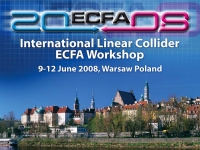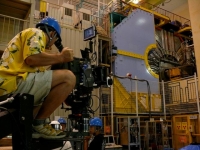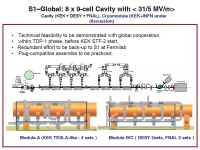The first meeting of the International Detector Advisory Group to be held in Warsaw

The International Detector Advisory Group will meet for the first time at the ECFA workshop in Warsaw. |
During the ECFA workshop for the International Linear Collider in Warsaw from 9 to 12 June, the International Detector Advisory Group (IDAG) will meet for the first time. The three concept groups of the ILC detector which expressed their interest to prepare letters of intent (LOI) will meet IDAG. The organisers of the workshop arranged an open session where the groups will present their ideas and plans for the completion of their LOIs. IDAG will validate the submitted LOIs next year. But communication between IDAG and the LOI groups will start already in Warsaw.
Read more...
-- Sakue Yamada
Research Director's Report Archive |
 |
|
|
 |
Upcoming meetings, conferences, workshops
LoopFest VII
Radiative Corrections for the LHC and ILC
University at Buffalo, Amherst, New York, USA
14-16 May 2008
ICFA NANOBEAM Workshop
Budker INP, Novosibirsk, Russia
25-30 May 2008
XXII Symposium on Photonics and Electronics for Accelerators and High Energy Physics Experiments
Warsaw University of Technology Resort, WILGA
26 May - 1 June 2008
 GDE Meeting - ILC Conventional Facilities and Siting Workshop GDE Meeting - ILC Conventional Facilities and Siting Workshop
JINR, Dubna, Russia
3-7 June 2008
International Linear Collider ECFA Workshop (ECFA 2008)
Warsaw, Poland
9-12 June 2008
Polarized Positron for Linear Colliders Workshop (Posipol 2008)
Hiroshima University, Japan
16-18 June 2008
European Particle Accelerator Conference (EPAC'08)
Genoa, Italy
23-27 June 2008
Upcoming schools
The second Trans-European School for High Energy Physics (TES-HEP)
Buymerhovka, Sumy region, Ukraine
3-9 July 2008
Third International Accelerator School for Linear Colliders (2008 LC School)
Oak Brook, Illinois, USA
19-29 October 2008
|
|
 = Collaboration-wide Meetings = Collaboration-wide Meetings
GDE Meetings calendar
View complete ILC calendar
|
|
|
 |
 |
|
|
 |
Kamisama no Puzzle - Accelerator goes Japanese movie

Filming crew at KEK.
(Photo: Youhei Morita) |
Accelerators have featured in some movies, Terminator 3, for example. But people outside of the physics world did not notice much. In this summer, cult director Takashi Miike will make the accelerator quite visible in his newest film "Kamisama no Puzzle" (God's Puzzle). Miike, who allegedly influenced Quentin Tarantino, is best known for his grotesque horror films including Ichi the Killer, Audition, Gozu, and One Missed Call. This time, fortunately, it is not his usual line; the movie is a sci-fi romantic comedy based on a prize-winning, bestselling novel by Shinji Kimoto. The story is about twin brothers, one a physics student and the other an aimless self-proclaimed rock musician. The latter agrees to attend physics class for his brother and is obliged to team up with a 17-year-old girl genius to unlock the secrets of the universe and to create one of their own, using an accelerator.
Read more...
-- Rika Takahashi |
 |
|
|
 |
From Earth&Sky Radio
12 May 2008
Will string theory be proven?
Brian Greene: These ideas, which we have long thought to be way beyond testability, we’ve realized that there’s at least a chance, a glimmer of a hope, that in the next few years some of these ideas may be subject to testability.
Read more... |
|
From Physics World
8 May 2008
Nobel laureates petition Bush over funding shortfall
A group of 20 Nobel-prize-winning physicists have written to US President George Bush, asking him to work with Congress to find at least $510m in "emergency supplemental funding" for the agencies that pay for much of the nation's physics research.
Read more... |
|
From asimmetrie
April 2008
Acceleratori, non solo ricerca
Acceleratori lineari e circolari, piccoli o grandissimi, per materia o per antimateria... ma per fare che cosa? Innanzitutto ricerca di base sulla struttura del mondo che ci circonda, a scala via via più elementare e quindi a energie sempre più elevate.
Read more... |
|
|
 |
Globalising R&D

The S1-Global plan and configuration. |
The coordination of superconducting radiofrequency R&D is central to the Global Design Effort's mission of bringing the design for the ILC to the point we can make a robust proposal to our governments. Our efforts are becoming globalised more rapidly than we had envisioned. To achieve our goals and main milestones, we must be focused, eliminate duplication and work together. The latest important move towards globalisation is what we are calling "S1-Global," a planned cavity-string performance test as a global effort, using the superconducting radio frequency (SCRF) test facility at KEK called STF. S1-Global was a major subject of discussion at the recent week-long ILC meeting on SCRF R&D and the basic approach has been agreed to.
Read more...
-- Barry Barish
Director's Corner Archive |
|
arXiv preprints
0805.1504
Tracking and Vertexing with a Thin CMOS Pixel Beam Telescope
|
|

